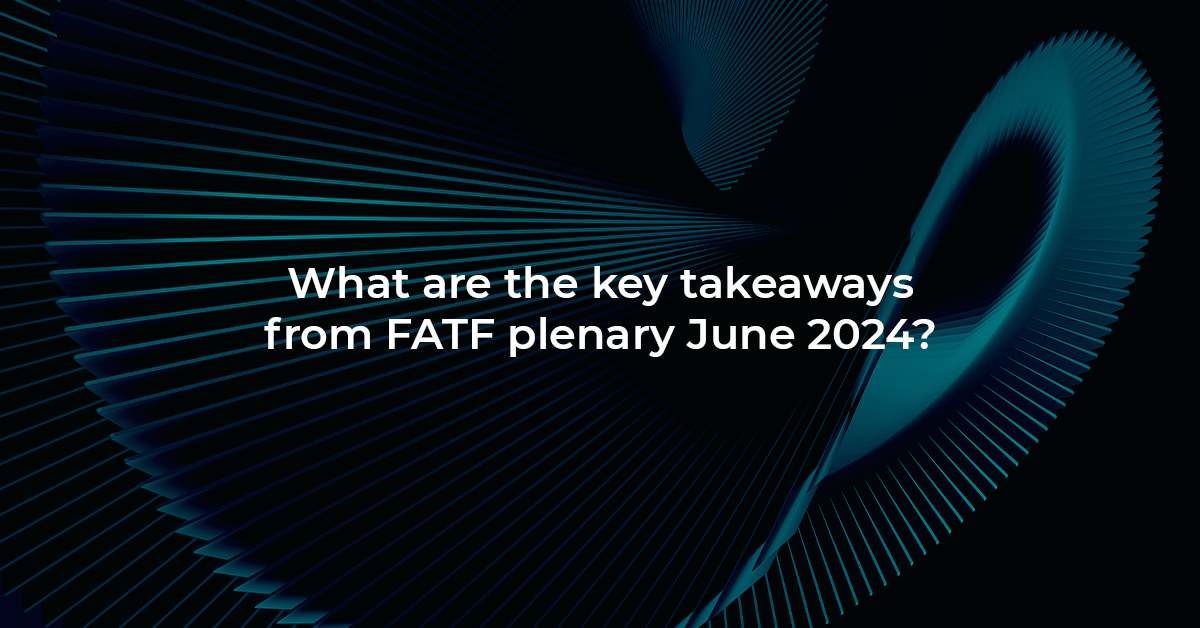
What Are the Key Takeaways from the Financial Action Task Force (FATF) Plenaries in February and June 2024?
In 2024, the Financial Action Task Force (FATF) held two major plenary meetings—February in Paris and June in Singapore. These meetings brought together global experts to address money laundering (ML), terrorism financing (TF), and financial crime. The most significant outcomes were the UAE’s removal from the grey list, Türkiye’s delisting, and the evaluation of Kuwait’s AML/CFT efforts.
Revising the Criteria for Prioritizing Countries for the ICRG Review Process
The most controversial issue during the 2024 plenaries revolved around who should be subjected to the International Cooperation Review Group (ICRG) process which is commonly referred to as grey listing or blacklisting. The revisions aim to create a more transparent risk-based process of categorizing the countries with the relative deficiencies regarding the procedures on combating money-laundering/countering the financing of terrorism. This takes into consideration additional factors concerning the circumstances in the developing countries realizing the necessity of ensuring that financial institutions dealing with companies in high-risk countries enhance their compliance programs to meet the new requirements on cooperation.
Updates in Methodology
FATF introduced changes to its evaluation methodology in 2024 to improve global cooperation, particularly in asset recovery. Countries are now required to show tangible outcomes beyond compliance, such as successful asset confiscation and effective criminal prosecution. The revisions indicate that merely complying with technical laws is insufficient; nations must demonstrate real-world results in combating financial crime.
Jurisdictions Under Increased Monitoring and Türkiye’s Delisting
The June 2024 plenary updated the list of jurisdictions under increased monitoring, adding Monaco and Venezuela while removing Türkiye and Jamaica. Both Türkiye and Jamaica had met FATF’s expectations by following their Action Plans to address deficiencies in their AML/CFT frameworks within the designated timeframe. FATF congratulated them for their success while emphasizing that they must continue collaborating with FATF and regional bodies to reinforce their strategies.
UAE’s Exit from FATF’s Grey List: February 2024 Milestone
One of the major outcomes of the February 2024 plenary in Paris was removing the United Arab Emirates from FATF’s grey list. The UAE had been placed on the grey list back in March 2022 because of the detected weaknesses in its AML/CFT framework. Over the next two years, the UAE implemented substantive reforms that eventually led to delisting. This move is expected to reassure investors about the UAE and boost its position in the international financial community.
- Stronger controls over high-risk sectors: the UAE enhanced the regulatory regime for high-risk sectors in real estate and gold trading as well as DNFBPs.
- Stronger investigation and prosecution: the UAE, during 2023, imposed over AED 115 million (USD 31 million) in fines and over AED 925 million (USD 252 million) in asset confiscations. The country instituted Courts of Specialized Competences for AML/CFT Cases.
- Better International Cooperation: The UAE improved cooperation, collaboration, and support with financial intelligence units around the world in dealing with the menace of cross-border crimes.
Kuwait’s Mutual Evaluation Report: June 2024 Insights
During the June 2024 plenary, Kuwait’s mutual evaluation report highlighted both achievements and challenges. While Kuwait has established robust regulatory frameworks, FATF noted that the country struggles with achieving tangible outcomes, particularly in asset recovery and managing risks in the non-profit sector, which remains vulnerable to misuse for terrorism financing.
Kuwait will continue working closely with MENAFATF (Middle East and North Africa Financial Action Task Force) to improve its risk assessment strategies and apply specific measures to safeguard its financial sector from criminal threats.
Horizontal Evaluation of DNFBP Technical Compliance Regarding Corruption
Another important topic discussed at the 2024 plenaries was the horizontal review of Designated Non-Financial Businesses and Professions (DNFBPs). This review focused on whether DNFBPs, such as lawyers, real estate agents, and accountants, were adequately regulated to prevent misuse for ML and TF. FATF’s conclusions showed that many DNFBPs still fail to comply fully with international standards, making them vulnerable to exploitation.
Revising the FATC guidelines concerning payment transparency
It has been quite an important issue for the sector to address payment transparency in the ongoing battle, against money laundering and terrorist financing activities. The increasing trend of globalization has led to a rise in both the volume and intricacy of border payments’ has acknowledged this challenge and the necessity for transparency regulations. They have decided to revise their standards to align with the changing landscape of border payment systems and new industry norms such, as ISO 20022. The FATFs main goal, with the revisions is to speed up border payments and make them more transparent and inclusive while ensuring they comply with AML & CFT regulations.
In summary
The recent FATF 2024 meetings highlighted the significance of teamwork and adherence to combat misconduct effectively. Countries, like the UAE and Türkiye being removed from the watch list indicates promising advancements in enhancing frameworks for money laundering and combating the financing of terrorism (AML/CFT). Despite these steps, however, challenges persist for nations like Kuwait that need to focus on producing tangible results in areas such, as recovering assets and conducting risk assessments. FATF will continuously refine its criteria. Oversee jurisdictions to ensure they proactively combat money laundering and terrorist financing activities.
Serkan Arslan, CAMS, Sales & Business Development Director
